- Home
- Cynthia Voigt
Orfe Page 2
Orfe Read online
Page 2
The ends of my mouth pulled down and I couldn’t stop the quivering. My eyes overflowed.
“It was just an ordinary morning,” they said, “like today, and there must have been kids in school then too.”
“And they blew everything up, all it took was planes in the sky, the Enola Gay.”
The sky overhead was empty.
“Before you could turn your head to see what it was—whoosh—gone—”
“Except for the survivors. ’D’joo see those pictures, Enny?”
I had seen them.
“Except for the ones who looked normal, after, but there was radiation and they had monster babies—”
Orfe stood with her head bent down.
“It happens here too, but they don’t tell you. It’s in the air. From the testing. In milk because the cows eat the grass that grows in the air. Nobody can stop them. They’re the government, they’re the army.”
Tears oozed down my cheeks. I was sick with fear and pity.
“If you’re the strong one or rich or just big—like parents—”
“Nobody can stop parents from beating their kids.”
“And the kids snivel, like Enny, or they’ll scream if it’s bad enough—”
“And the parents like that, a lot of them do. It’s a turn-on. Know what I mean?”
“She wouldn’t know. She doesn’t know anything about anything.”
Orfe raised her face to look at me. What’s wrong with you? I could hear, as clear as if she’d said it.
I didn’t know. I couldn’t help it.
* * * * *
“I really hate it when you cry like that,” Orfe said.
My eyes filled with tears. I couldn’t say anything, for fear of crying if I tried to say something.
“Look,” Orfe said. “I didn’t say you shouldn’t cry. I said you shouldn’t cry like that. When they start in on you, the way you sort of weep with your head bent like some . . . slave or something.”
“I know. I’m sorry,” I said, tears oozing out and mucus thickening in my nose and thickening my voice.
“Just letting them get away with it,” Orfe said.
I nodded and wiped my nose with the back of my hand, then wiped my hand on the seat of my jeans.
“Helpless, I hate it when you—”
I shook my head, to clear it, to get her attention, to tell her she’d better stop saying that, please. “I can’t help it,” I explained.
“I know.” Orfe’s eyes filled with tears, but she blinked them clear. “I know. I know exactly. You have to do something to those boys.”
“They’d just laugh. It wouldn’t make any difference.”
“Just because you’re crying doesn’t mean you can’t hit someone—or throw something—your lunch box or your desk. That desk could hurt somebody. Or you could kick—kick Rab because they all do what he tells them to, that’s what they’re doing. You know what I mean?”
I knew what she meant.
“Or yell at them, at least. You can cry and still do all those things. It doesn’t have anything to do with crying. I would too, I don’t blame you.”
“I do,” I said. I turned to go home.
“Wait.” Orfe’s hand held my arm and she tried to pull me around.
“I’m sorry.” I just wanted to get away and go home.
“For what?” Orfe asked.
I wished she’d leave me alone.
“Where are you going, Enny?”
“Home.”
“Why?”
“Because—” But I couldn’t say it. “Because—”
Orfe shook her red hair and lost patience with me. “You make me so mad, you really—”
“I said I was sorry.”
“You act like you’re nothing, some absolute nothing. You’re as pretty as Frannie and you know it, even prettier in your own way. And better at math than anyone in the class. But you act as if, if you can’t be one particular way, you’re nothing. As if there was one way you had to be—”
I stared at Orfe, but she didn’t notice me.
“It’s so dumb and you’re really smart.” Her feet danced on the sidewalk in impatience and anger. “You’re more like me than anyone I ever met before!”
“No, I’m not.” I was shocked. “Orfe, I’m not at all like—I’m not musical at all. I care about school, I like school. I’m not brave. I care about other people, I pay attention, I’m not self-centered. I’m just or-di-nary.”
“It’s ordinary to be self-centered,” Orfe said to me. She was standing still now and about to burst out laughing—I could see that in her eyes. “Maybe you’re the one who’s extraordinary.”
Orfe cared about having me for her friend. She cared about me. Nothing much else mattered at that moment. “I feel better,” I said, which was the truth.
But they still returned and circled me in the hallway or on the playground or at my desk. I still hunched down over my desk until I wept with their words.
Orfe at her desk next to mine had her own head bent—as I now understood—so that she wouldn’t have to witness my shame.
Until one day she raised her face and it was anger shooting out of her eyes. “Cut that out,” she said. “You, Rab—what you’re saying is—horrible, you’re—”
Rab’s cheeks were pink and his eyes were bright. “Lookit that, will you?” he asked. “ ’D’joo hear? The Creature speaks.”
Orfe pushed herself up from her seat. “The things—what you’re saying—”
I didn’t know what she was going to do, I couldn’t imagine.
They were laughing. Orfe was about halfway standing up, leaning toward Rab with her hands flat on the desk and her face pushing toward him—when she threw up. She vomited—it was sickening—hard, so hard that some of it spattered onto Rab’s face from his chest. You could hear the vomit hitting his chest.
I stopped crying. I wiped at my eyes. I was worried about Orfe, if she was sick and how I could help.
Orfe vomited again, like a hand pump when the pressure comes right and suddenly water pumps out.
I remembered that she’d said she could do it on purpose. I sat dumb and wondered.
Rab tried to leap back, but the boys were in his way. “Goddamn it!” he bellowed.
Orfe leaned forward, turning her head to one side, like pointing a hose. The boys behind Rab scuttled away. “You fucking did that on fucking purpose!” Rab shouted in a fury, his chest dripping, chunks falling, and a stink rising from him.
Rab was of course sent home. The teacher dragged him out of the room by his arm for swearing like that. The principal suspended him for two days. I accompanied Orfe to the nurse’s room and sat with her while she recovered. I had the foresight to bring my lunch box with me, and we shared the sandwich, cookies, and fruit equally between us.
* * * * *
Orfe had routed them and I was proud of her, but the day Rab returned they were back, and Orfe was sitting with her head bent, and my eyes were filling with tears. It was as if all of Orfe’s victory was good for nothing, except that they stood a safe distance back from her desk now. All the trouble she had gotten Rab into was worth only a few inches in the end. As if what Orfe did wasn’t worth anything.
So I took my lunch box and tried to hit Rab in the face with it, or over the head. My lunch box was metal and had sharp corners. He grabbed it, but I wasn’t about to let it go. I kept my hold on the handle even while I was pulled up out of my chair, and I came around from behind the desk—where I could kick at his shins while he held my lunch box over my head and danced his legs free. I don’t know what he was saying because I was crying. But now I was crying from the sheer excitement of hitting at Rab and kicking him.
I had detention that day, copying over one hundred times, “I will not fight in school.”
The next day I got a good clip in, across his cheek and nose, a wide broadhand with the lunch box, before he could block it. Blood poured out of his nose, and I spent the afternoon sitting on a chair out in
the hallway. I sat alone, with nothing to do, no books or papers, feeling glad. Feeling as if I had been shut up in a little closet, but now I had broken down the walls and broken myself free.
After that, a couple of times, I was sent to the principal. I didn’t care and it didn’t make any difference to the way I acted. If Rab came near me and jabbed his nose at me that way, I would go crazy. Sometimes I would cry and go crazy, and sometimes I would not cry and go crazy. But every time I would try to club him a good one—on the hands or head, ears or elbows, anywhere it would hurt. Rab had no idea what to expect, and his friends hung back, out of danger. Rab only kept at it because he was embarrassed not to. I would hit him with my fist or my lunch box, or I’d shove my desk right into his hips—except after the first time I did that, he was always ready to hop back, away.
After a while Rab just gave up; they all did. “Who wants to waste time fighting a girl,” he muttered. They groused to themselves, “Girls are crybabies anyway, they don’t fight fair, you’re always never allowed to hurt them. Who cares?” they said.
Orfe raised her face at that and looked at me. I don’t know what I looked like, with rage draining out of me, but Orfe’s eyes shone out glad. That’s what I mean, I could hear, as clear as if she said it. I think my eyes must have been shining too.
Even though I moved away and left Orfe behind, I didn’t forget her. Even if I’d never seen her again, I would have remembered Orfe. As it was, I wasn’t surprised to be the one she asked to go before them when she and Yuri walked out together to be married. I think my eyes must have been shining then too, and I know that Orfe and Yuri radiated a sense of loving that I can still warm my hands at, if I close my eyes and remember.
TWO
I don’t remember why I was on that street on that day, at that time. I saw the gathering of people at the same time that I heard the singer’s voice. The song floated like light. Both particle and wave, if light, the song seemed unlike anything else in the sensual world.
The singer stood with bent head, so I could see only a long mass of copper-colored curls. Then she raised her head in a remembered gesture and I recognized Orfe, across all the years.
In jeans, turtleneck, and boots, Orfe could have been taken for a scrawny young man or a slender young woman; it didn’t matter which. Her hair spread around her face like a cloud. Her eyebrows were dark, and her narrow nose almost projected into a hook. When she had finished singing, hands went into pockets and purses to find money to drop into the upturned hat at Orfe’s feet.
Until the crowd had disbanded, Orfe didn’t notice me. When she did, she picked up the hat without counting what was in it and came toward me.
I wasn’t sure of her then. “Orfe?”
“Have I changed that much?”
I shook my head to say no. “Older.”
“It’s been years. What did you expect?”
I shook my head again, to clear my thoughts, for wonder. I had never expected anything and certainly not—
Orfe opened the hat and peered into it. “I can buy you a cup of coffee.”
“More than one.” I poked my finger at a ten-dollar bill.
“Unh-uh,” Orfe said. “My room for the night comes out of this, and meals.”
“Stay with me,” I invited her. “It’s a dormitory, but I’ve got a single, plenty of floor space.”
She didn’t hesitate to accept any more than I had hesitated to ask. “In that case, I can buy you a sandwich. Aren’t you hungry? Don’t tell me anything yet, wait until we sit down and I can really pay attention—and you, you too, you can really pay attention. Wait’ll you hear what’s been going on with me.”
I couldn’t imagine and, imagining, was already caught up in Orfe’s excitement. But first I had to answer her questions about myself as we ate, and drank glass after glass of iced tea, and talked. “Why a degree in business?” Orfe asked.
Most people thought that but didn’t ask. “I want to earn a good living. I’m good at management and applied economics, statistics, fitting all the pieces together.” Most people thought that if you were a business major, you weren’t their kind of person. “The workplace is so much of your life, you know? Work is so central, what you do to make your living.”
“You don’t look like a business major,” Orfe said.
“What do I look like?”
“Who’d have thought you’d turn out so lovely?”
“Not me,” I admitted. “But I’m glad I did. I enjoy it.”
“Good for you.” She studied me. “Not beautiful but—almost as if you are. People must look at you a second time and be disappointed.”
I had forgotten Orfe’s way of saying exactly what she thought, rather than what she thought you wanted to hear. I had forgotten what it felt like to have something nobody seemed to understand understood. “Yeah,” I said, and felt the smile on my face. I couldn’t stop smiling. “It’s enough to make a person insecure, if she’s banking on her looks. But you too, you’ve turned out—” I stopped, because she wasn’t pretty, wasn’t even fine-looking, was only just barely not unattractive; except of course that there was something about Orfe that made you want to look at her and keep on looking. Arresting.
“I wear myself naked,” Orfe said. “That makes it hard for people to figure out what it is about me. My friends get used to it. Are we still friends?”
“I’d like that.”
“Me too.” Orfe drank at her glass of tea. “I missed you.”
“No, you didn’t,” I told her.
“Did too.”
“But you didn’t—but I didn’t miss you—”
“That’s who I am,” Orfe said, “and who you are.”
“I figured you would have forgotten all about me. We were kids.”
“How could I forget? We were kids,” she said. “I guess a business degree just doesn’t sound like you, Enny. Unless you’ve changed.”
“Of course I’ve changed,” I told her. “You helped.”
“Just at the beginning.”
“Once changes start, you know you can’t keep them from moving along.” I smiled again. “It feels, like, every year older I get the more I own myself. I like being older.”
“Why, because kids are so helpless?”
“You were never helpless. Were you?”
She shrugged, lowered her head, raised her face to me. It had never crossed her mind to be helpless.
I wanted her to understand. “I don’t see why commercial success can’t be . . . virtuous or . . . honorable. Do you? There are companies that are successful and also good employers, good corporate citizens too. You don’t have to be avaricious just because you’re making money, do you?”
“I wouldn’t know,” she said.
“Like Ben and Jerry’s,” I said. “Like the Body Shop, like—” I stopped myself. “Isn’t that what you wanted me to be like?”
“Depends,” Orfe said.
“Depends on what?” I was getting irritated. “Anyway, I don’t care,” I said. “It’s what I want for myself.”
“Well, then,” Orfe said. She stopped the waitress and asked for a cup of coffee. I asked for the same. “Are you sure it’s okay if I stay with you? I don’t have any bad habits, in case you’re wondering—”
It hadn’t crossed my mind.
“The school won’t object?”
The school wouldn’t care, I assured her.
“Then I’d be grateful. It would be a help, and fun too.”
“Good.” I waited, feeling talked out. It was Orfe’s turn. “Aren’t you going to tell me?”
“Tell you what?”
“How do I know? All I know is, you said you’d tell me while we ate.”
“Oh.” She seemed abstracted, watching her fingers pick up potato chips.
“And we’ve finished eating,” I said.
“It’s not much, nothing much, and I was thinking about something else—running into you again because—I heard on the radio, somewhere, a while ago .
. . They found a warehouse, in some city in Vietnam, and stacked up in it, in the warehouse, like . . . like boxes of stereos in a warehouse, or bags of flour, there were bodies. Skeletons. With tags tied to their big toes, with dog tag numbers on their toes. And I was thinking, each one of them was having a life, his own life. And I was thinking, most of them were our age, probably.”
“Probably most of them were black too,” I told her, my voice thick.
“Oh, shit,” Orfe said. “I never thought of that, but you’re right.”
“Or Indian,” I said, making myself keep after the truth.
I watched the top of Orfe’s head after that, making myself face the picture she had put before my mind’s eye. After a pretty long time, she asked, “How’d you like it?”
“Like what?”
“My performance.”
“I only heard the very end.” I tried to remember my exact impressions. “Your voice is wonderful, but you must already know that. I never heard that song before.”
“Because it’s original.”
“I only heard the very end,” I apologized. “So you still want to be a musician? Can you earn enough to live on, on the streets? I don’t mean that the way it sounds.”
“I can. I lived a couple of years all over Europe that way. But—I just joined up with a band. The lead singer asked me, and I said okay, so—we’ve played a couple of gigs, we’ve got one coming up, I’m thinking about asking you if you want to see it. But—”
After a while, “But what?” I asked.
“Oh . . . It’s metal, and I’m not sure how you feel about metal. We’re a metal band, Jack and the Jackets—don’t say it, Enny, okay?”
I didn’t.
“And we’re not very good. We’re okay good but not nearly good enough. Not nearly as good as I am by myself.” She wasn’t apologizing, she was explaining. “And your opinion—what you think matters to me.”
Orfe leaned forward to tell me about it.
“The drummer could be good, if only he’d work. I mean work, you know what I mean? Not just . . . Just because you have more talent than most people doesn’t mean you don’t have to work at it. The rest of them don’t matter, they don’t bother me, but Smiley could be really good if he’d just stop waiting around for whatever it is he expects will be given to him. Just given. Like some Christmas present from Santa, just given stark free. You know? Or if he’d stop looking for the high that will—be the angel he can ride where no drummer has ever gone before. Making him famous and rich. Or something. It makes me mad,” Orfe said.

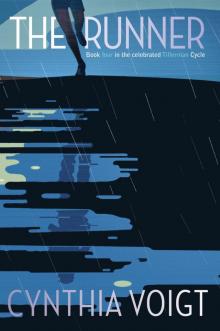 The Runner
The Runner By Any Name
By Any Name Bad Girls, Bad Girls, Whatcha Gonna Do?
Bad Girls, Bad Girls, Whatcha Gonna Do?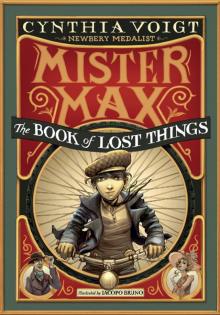 Mister Max: The Book of Lost Things: Mister Max 1
Mister Max: The Book of Lost Things: Mister Max 1 The Wings of a Falcon
The Wings of a Falcon Bad Girls in Love
Bad Girls in Love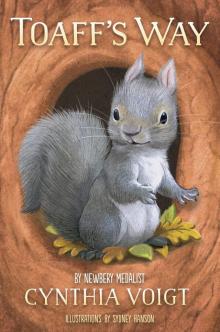 Toaff's Way
Toaff's Way Building Blocks
Building Blocks Orfe
Orfe Tell Me if the Lovers Are Losers
Tell Me if the Lovers Are Losers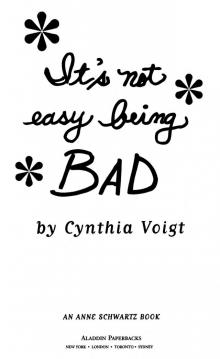 It's Not Easy Being Bad
It's Not Easy Being Bad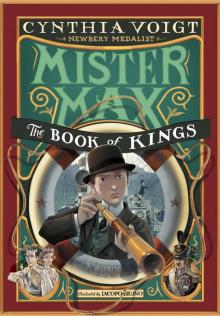 The Book of Kings
The Book of Kings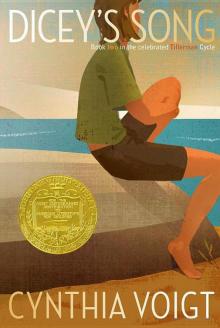 Dicey's Song
Dicey's Song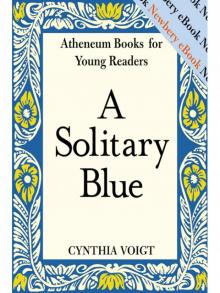 A Solitary Blue
A Solitary Blue Tree by Leaf
Tree by Leaf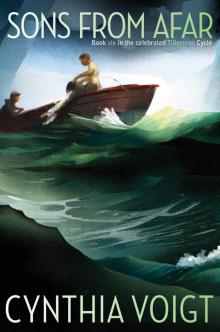 Sons From Afar
Sons From Afar Teddy & Co.
Teddy & Co. Jackaroo
Jackaroo Elske
Elske Izzy, Willy-Nilly
Izzy, Willy-Nilly Come a Stranger
Come a Stranger Mister Max: The Book of Secrets: Mister Max 2
Mister Max: The Book of Secrets: Mister Max 2 Seventeen Against the Dealer
Seventeen Against the Dealer The Callender Papers
The Callender Papers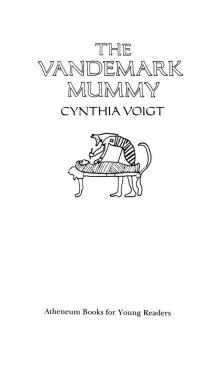 The Vandemark Mummy
The Vandemark Mummy Tale of Birle
Tale of Birle Glass Mountain
Glass Mountain The Tale of Oriel
The Tale of Oriel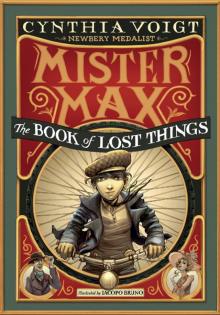 The Book of Lost Things
The Book of Lost Things The Book of Secrets
The Book of Secrets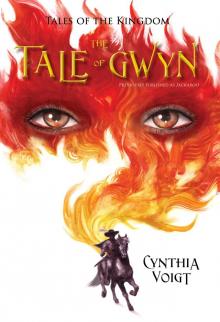 Tale of Gwyn
Tale of Gwyn